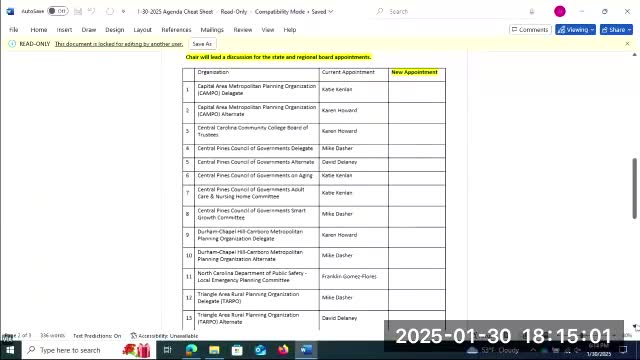Chatham County to pursue honorary signs recognizing poet George Moses Horton; staff to draft amended resolution
Get AI-powered insights, summaries, and transcripts
Subscribe
Summary
After a review of prior resolutions and North Carolina Department of Transportation rules, the board gave direction to staff to draft an amended resolution exploring honorary signage or revised welcome signs honoring George Moses Horton, subject to DOT rules, family consent and cost estimates.
Chatham County commissioners on Jan. 30 directed staff to draft an amended resolution to pursue recognition for George Moses Horton with roadside signage, favoring an honorary designation or signage added to county welcome signs rather than a formal road-name change.
County staff reviewed a prior 2021 resolution that proposed renaming the stretch of U.S. 15-501 through Chatham County and a 2022 amendment that shifted the request to an honorary designation (highway signage). Emergency management director Steve Newton reported that North Carolina Department of Transportation (DOT) rules limit an honorary designation to a maximum five-mile segment and impose an additional constraint that a namesake cannot have been deceased longer than 75 years without a DOT waiver. Staff said a DOT waiver would be required to apply the honorary designation across the entire approximately 22.5-mile stretch referenced in the original resolution.
Because of those limitations and the logistical burden and costs of an actual road-name change (address updates in mapping platforms, businesses and residents updating materials), staff proposed an alternative: working with DOT to add contextual language about George Moses Horton to the county's "Welcome to Chatham County" signs at county entry points from Lee and Orange counties. That approach would avoid address changes while providing context about Horton's significance. Staff told the board the county would pay for design, fabrication, installation and ongoing maintenance if the board chose the welcome-sign option; staff will return with cost estimates.
Commissioners and speakers discussed next steps: staff will seek DOT clarification on the waiver process and on character/line limits for welcome-sign text, contact identified family members or descendants for consent or agreement, and draft an amended resolution for formal action. One commissioner said UNC maintains the largest collection of Horton's work and noted there may be family contacts through recent scholarship; a resident, Mark Barroso, was acknowledged for raising the issue publicly.
No formal vote was taken on a final resolution at the meeting; the board provided direction that staff should proceed with research and draft the amended resolution and cost estimates for future action.
